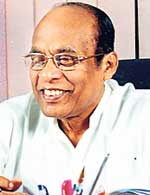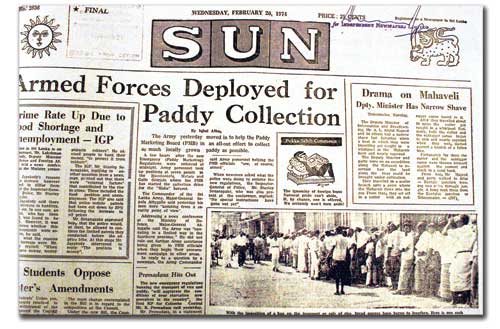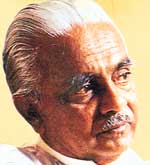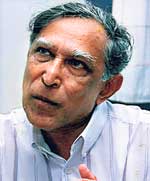
Positives matched by negativesVeteran politicians and community leaders express their diverse views on 30 years of the free economy providing plus and minus points
D.E.W. Gunasekera, Secretary General of the Communist Party and a cabinet minister, noted that J.R Jayewardena introduced the open economy with the aim of gaining rapid development in the country and moving away from a socialist regime of tightly regulated imports and exports. He said that he would like to call it neo liberalism in political terms rather than branding it as open economy. Neo liberalism had emerged after the collapse of the Soviet Union’s balance of power in the world order. Jayewardene’s government had not resorted to privatization of public institutions although free trade system was introduced during this period. Free trade system and privatization of government institutions came into being during the era of President Ranasinghe Premadasa and it was continued during the regime of President Chandrika Kumaratunge.
He said neo liberalism advocated governments to abandon its involvement in economic activities and to hand it over to the private sector. In those days of economic liberalisation what was imported was not in the interests of the country. It was a question of how much profit one could make from it. Sri Lanka rushed through the process without considering its consequences on poverty and unemployment. He believed the negative side of the free economy was greater than its positive side and Sri Lanka today is experiencing this reality of economic disparity in various provinces in the island. However the anticipated development under the open economic system has also been hindered by the war which had emerged owing to ill effects of the same system. Gunasekera was of the view that the government and the private sector should handle the country’s economic activities hand in glove to achieve prosperity giving high priority to the human development aspect. Even the World Bank and the IMF were advocating poverty reduction measures along with economic reforms, he said. Implementation of major reforms in the civil service and education sectors and more disciplined spending and improved revenue collection would help generate stronger economic growth, he said. Foolish move
Dr A.T. Ariyaratne, leader of the Sarvodaya Movement, said the introduction of the free economy in 1977 was the most foolish step taken by the then government. Looking back at the achievements of 30 years of the free market economy, he said as a true Sri Lankan committed to community service and poverty alleviation, he is not satisfied with the so called progress gained through this system which brought benefits to multinationals, certain local corrupt officials and a handful of individuals. Dr. Ariyaratne said, “We have made a terrible mistake by implementing this system in accordance with the dictates of foreign donor agencies and some developed countries whose aim was to find dumping grounds for their excess products.” The free economy ruined indigenous industries, entrepreneurs, businessmen and organisations that were contributing immensely to the local economy before 1977. Those were the days when the World Bank, the IMF and donor countries wanted Sri Lanka to implement the Structural Adjustment Programme provisions which resulted in the death of local production, dependence on imports and rising unemployment. Governments which came to power since 1977 have spent valuable foreign exchange in a liberal manner increasing the foreign exchange deficit. The rise in foreign borrowings has thrown ‘us to the wolves of the international community in a big way,’ he said. Dr. Ariyaratne asserted that the only way out for Sri Lanka is to mobilise its brains and resources towards sustainable development by resurrecting the agriculture and indigenous industry. Considerable economic growth
Godfrey Goonathilake, founder of the Marga Institute and a respected retired civil servant, said the economic reforms helped to maintain considerable economic growth in the island as all successive governments had followed a similar macro economic framework with slight changes for the benefit of masses. All these governments have not deviated from the economic liberalization process although President Chandrika Kumaratunge’s administration promised to give the free economy a human face. However the significant feature of the whole process was the political consensus on the macro economic frame work maintained by all these governments under a free economy. Goonathilake said the post ‘77 period laid the foundation for a market economy deviating from dependence on the plantation economy. This has helped to maintain considerable economic growth even during periods of adverse weather conditions. The per capita income of Sri Lanka has increased by four fold over the last 25 years while the country has been able to earn considerable foreign exchange from apparel exports and the manufacturing sector due to a free economy even amidst a war situation, adverse weather conditions and political constraints. He noted that the free economy brought positive results although it had failed to bring more prosperity to the country due to ethnic conflict, economic mismanagement, waste and corruption. The fundamental economic problem since the 1970s has been the declining terms of trade. The proceeds from the traditional agricultural exports of tea, rubber, and coconut have had less and less value in the international market place. The United National Party (UNP) contested the 1977 general election calling for less regulation of the economy. After its electoral victory, the new UNP government made some effort to dismantle the state sector in agriculture and manufacturing. At the same time, it encouraged private enterprise, welcomed foreign investment and slackened import controls.
It also shifted spending away from subsidies and social welfare to investment in the nation's infrastructure, most notably a massive irrigation project, the accelerated Mahaweli Programme, which was expected to make Sri Lanka self-sufficient in rice and generate enough hydroelectric power to fill the nation's requirements. These policies resulted in higher rates of economic growth in the late 1970s and early 1980s, but at the cost of a mounting external debt. Foreign aid from the United States, Western Europe, Japan and international organizations kept the economy afloat. Sri Lanka's economy became more diverse in the 1970s and 1980s and in 1986 textiles surpassed tea for the first time as the country's single largest export. The country has experienced far reaching political economic and social changes during the 1977-1985 period. In the social sphere the policy makers attempted to rationalize the social welfare system by targeting the food subsidy and removing a wide range of subsidies. Nevertheless after a period of relatively steady growth ranging from 8.2 percent in 1978 to 5 percent in 1985 the economy suffered a sharp downturn in the five years that followed. Goonathilake said that the intriguing feature of this period was the decline of poverty during the 1985-90 period when the economy slowed down and poverty rose in the 1990-95 period during a period of higher economic growth. He predicted that if privatization continues and export orientation strengthens, weaknesses in government will have less impact on growth. Real growth is expected to continue in the 4-6% range but may remain below the 8%-9% growth needed to move quickly into the status of a middle-income or newly developed country, he added. Sirima would have
succeeded - DM Before 1977 even the so called elite in Cinnamon Gardens were growing vegetables like chillies or onions in their home gardens while some were planting agri crops or vegetables in flower pots. Some wealthy Colombo residents even started cultivations in areas like Polonnaruwa. He noted that agriculture had become important to the whole population of Sri Lanka as the world was experiencing a food crisis at that time. The then government had to impose restrictions on the consumption of food items due to this reason. Jayaratne said that the ban on transporting of stocks of rice was imposed to prevent the export of rice to India by local unscrupulous traders. The fundamental economic problem since the 1970s has been the declining terms of trade. The proceeds from the traditional agricultural exports of tea, rubber, and coconut have had less and less value in the international market place. Therefore the then government had no alternative other than to follow a closed economic system. If this system was allowed to continue for a few years even with some difficulties for the people, Sri Lanka would have been self sufficient with food by now, he said. Soon after the introduction of the free economy in 1977 by the J.R Jayewardane regime the local agriculture and industrial sectors were badly affected due to the importation of commodities which can be produced locally. Planning Minister P Dayaratne, a UNP MP in the 1977 parliament, said Sri Lanka was able to achieve considerable development in sectors such as telecommunications and IT as a result of the free market. But he added that Sri Lanka failed to achieve expected positive results from this system not because it was bad but because of actions taken to fulfill promises given to the people by previous governments to gain political mileage, like in the bloated power sector for example. Consumers are now paying the highest electricity charge per unit in the world. Dayaratne was a long-standing energy minister in the UNP regime.
|
|
||
| || Front
Page | News
| Editorial
| Columns
| Sports
| Plus
| Financial
Times | International
| Mirror
| TV
Times | Funday Times|| |
| |
Copyright
2007 Wijeya
Newspapers Ltd.Colombo. Sri Lanka. |



